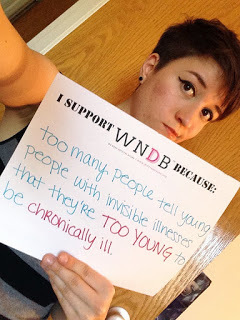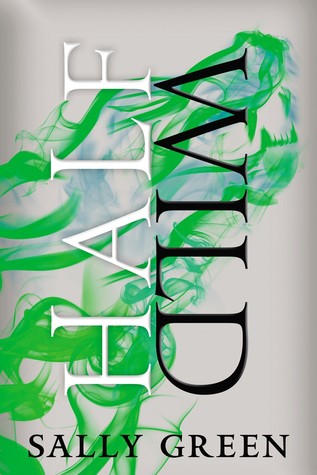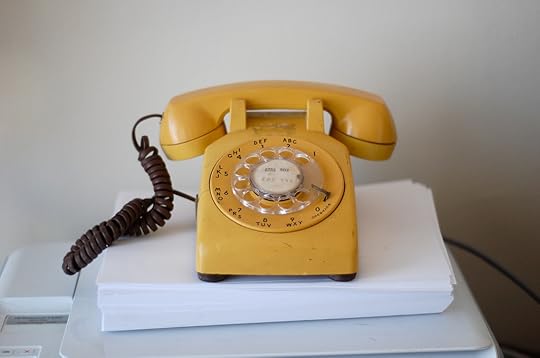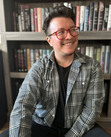Gabe Cole Novoa's Blog, page 62
May 6, 2015
Why the “Miracle Cure” Trope Hurts
 Photo credit: MoiSo I have a lot of feelings about the Miracle Cure trope. And while I’ve kind of talked about it online, I haven’t much, mainly because talking about it borders on talking about something else that I’ve deliberately not spoken about online. Namely, why it matters so much to me.
Photo credit: MoiSo I have a lot of feelings about the Miracle Cure trope. And while I’ve kind of talked about it online, I haven’t much, mainly because talking about it borders on talking about something else that I’ve deliberately not spoken about online. Namely, why it matters so much to me.But lately I’ve been wanting to talk about it openly. I’ve had a lot of feelings about a lot of related things and I want to be able to say something without feeling like I’m talking over someone else.
So I guess I’m going to talk about it now.
Back in October I took the post picture during the WDNB initiative. And then when time came to post it, I hesitated.
I looked at the picture, and I looked at the Internet, and thought am I ready to tell everyone? I’ve talked about my anxiety stuff before, but this always felt different to me somehow. Maybe because I wasn’t diagnosed until after I started Twitter stuff. Maybe because this was physical, and newish, and I still haven’t digested it emotionally some days.
Maybe because I’m starting to understand I may never fully digest it emotionally.
I wasn't ready then, and I'm not sure I'm ready now, but I’m just going to say it. I have rheumatoid arthritis.
For those who don’t know, which I’m assuming is most of you, the lowdown is this: rheumatoid arthritis is an autoimmune disease that causes my body to attack itself, particularly my joints and the lining between my joints. It’s a debilitating, incurable (thus, chronic) disease that causes chronic pain and usually affects people twice my age or older, but has also been known to attack many in my age group and even younger. I was diagnosed at twenty, but my symptoms started at nineteen. I’ll save the story for another day because this isn’t actually about that.
This is about the Miracle Cure trope.
There are many problems with the Miracle Cure trope, but the biggest, to me, is the insinuation that people who are chronically ill/disabled/neuroatypical can’t have happiness if they aren’t cured. This repetition of the happy ending = Miracle Cure is a punch in the stomach that says you aren’t whole unless you’re healthy.
What’s worse is that people believe it.
What made my diagnosis even more difficult for me, was many of my well-intentioned family members didn’t want to accept it. I can’t tell you how many times I heard something along the lines of “Don’t worry, we’ll find a way to make you healthy.” I can’t tell you how many arguments I had where I was told off for having a bad attitude when I said, “There isn’t a cure. I need to accept this.”
I’m not blaming anymore. I’m not complaining. I love my family and it just took time for everyone to come to terms with what was happening.
But a large part of the reason why that transition period was so rocky, and why those arguments were so hurtful was because we were back to the Miracle Cure that everyone was expecting. There was this message, over and over, of “you can’t be happy until you’re cured.”
Except I probably wasn’t going to be cured. Right now, at least, there isn’t a cure.
The Miracle Cure trope isn’t just something stupid we occasionally see in fiction. It’s a real, damaging thing that feels like a knife to the gut to those who are chronically ill/disabled/neuroatypical.
The Miracle Cure says, “it’s too hard for me to see you as Sick. I’d rather pretend you’ll be Healthy again soon.”
The Miracle Cure says, “thinking about you having an incurable condition is too scary. I’d rather pretend you’ll be Normal again.”
The Miracle Cure says, “you aren’t whole if you aren’t healthy, neurotypical, and able-bodied.”
The Miracle Cure trope hurts. And if I never see it again in fiction, or hear it referenced again in reality, it’ll be too soon.
Twitter-sized bites:
What's the big deal about the "Miracle Cure" trope? @Ava_Jae explains why it's so damaging on & off the page. (Click to tweet)
"The Miracle Cure trope isn't just something stupid we occasionally see in fiction." (Click to tweet)





Published on May 06, 2015 04:00
May 5, 2015
Vlog: How to Get Book Ideas
For me, figuring out the next book idea can often be the hardest and scariest part of the writing process. But here are some steps as to how I approach it:
RELATED LINKS:
Writing Discussion: Are You an Idea-Generating Machine?Writing a Novel in 15 Steps: From Initial Idea to QueryingOn How I Plot a WIPWrite for Yourself First (vlog)
How do you approach developing book ideas?
Twitter-sized bites:





RELATED LINKS:
Writing Discussion: Are You an Idea-Generating Machine?Writing a Novel in 15 Steps: From Initial Idea to QueryingOn How I Plot a WIPWrite for Yourself First (vlog)
How do you approach developing book ideas?
Twitter-sized bites:
Writer @Ava_Jae vlogs about the scariest part of her writing process: figuring out the next book idea. (Click to tweet)
Struggling to get ideas for your next book? Writer @Ava_Jae vlogs her idea-generating process. (Click to tweet)





Published on May 05, 2015 04:41
May 4, 2015
Discussion: How Do You Rate Books?
 Photo credit: guzzphoto on FlickrSo I've been doing a lot of book reviews lately, and it got me thinking about book ratings. Specifically, how drastically different some people approach the five-star rating and how some people (like myself) give five stars much more easily than others.
Photo credit: guzzphoto on FlickrSo I've been doing a lot of book reviews lately, and it got me thinking about book ratings. Specifically, how drastically different some people approach the five-star rating and how some people (like myself) give five stars much more easily than others.When I approach a book rating, I generally think of a book as starting at five stars. If I get through the book and I really loved it and I didn't see any major issues, it gets a five star rating.
If I read and find that I really enjoyed the book, but there was one thing that threw me off, or many several small things that bugged me, then it'll get four stars.
Three stars go to books that I enjoyed, but [something]. Sometimes it's a pacing or voice issue, sometimes it's a bunch of small issues, etc. But I still consider three stars a good rating and I give books that I enjoyed three stars.
Two stars drifts into "this was okay" territory. These books I didn't outright hate, but I wouldn't say I really liked them, either.
One star is...well...I think everyone knows what one star means.
Anything in between those gets a half star, and I round up when rating on Goodreads (but will say at the top of the review if I actually mean four and a half stars instead of five, for example.
So now I'm curious: how do you approach star ratings when reviewing a book?
Twitter-sized bite:
How do you choose star ratings when reviewing a book? Join the discussion on @Ava_Jae's blog. (Click to tweet)





Published on May 04, 2015 04:00
May 1, 2015
Book Review: HALF WILD by Sally Green
 Photo credit: GoodreadsOnce upon a time I read and reviewed Half Bad by Sally Green, then went on to tell a whole bunch of people about my favorite read of 2014 (which was, of course, the aforementioned dark YA Fantasy novel). So it’s probably little surprise that I pre-ordered Half Wild and was just a little excited to read it.
Photo credit: GoodreadsOnce upon a time I read and reviewed Half Bad by Sally Green, then went on to tell a whole bunch of people about my favorite read of 2014 (which was, of course, the aforementioned dark YA Fantasy novel). So it’s probably little surprise that I pre-ordered Half Wild and was just a little excited to read it.But before I go on, here’s the Goodreads summary:
“‘You will have a powerful Gift, but it’s how you use it that will show you to be good or bad.’
In a modern-day England where two warring factions of witches live amongst humans, seventeen-year-old Nathan is an abomination, the illegitimate son of the world's most powerful and violent witch. Nathan is hunted from all sides: nowhere is safe and no one can be trusted. Now, Nathan has come into his own unique magical Gift, and he's on the run--but the Hunters are close behind, and they will stop at nothing until they have captured Nathan and destroyed his father.”It can be a little hard to know what to expect from a sequel. Sometimes an author hits it out of the park, and it’s amazing, and sometimes it’s a let down (which is especially sadmaking when you loved the first book).
Half Wild, however, was definitely the former.
I had pretty high expectations jumping into the Half Bad sequel, and I have to say, those expectations were totally met. Half Wild is dark, exciting, full of action and complicated characters (and character relationships) and I was racing through this book to find out what happened. Nathan/Gabriel are one of my favorite ships, and I really loved some of the new characters and magic introduced in this book.
Like Half Bad, the voice is raw and arresting and it was interesting to see Green play with different formats and stylistic choices. There isn’t nearly as much second person POV in Half Wild as there was in Half Bad, but even though I loved the second person POV in Half Bad, I didn’t mind the shift.
Nathan’s character development has been super fascinating to watch, and the ending was seriously awesome, and 2016 is too far away because I want the next book now. If you like dark, violent, gritty YA fantasy, I honestly cannot recommend this series more. It’s on my perma-favorites list for sure.
Have you read the Half Life series?
Twitter-sized bites:
.@Ava_Jae gives 5/5 stars to HALF WILD by @Sa11eGreen. Have you read this dark, gritty YA fantasy? (Click to tweet)
Looking for an intense, action-packed YA fantasy? Check out HALF WILD by Sally Green. (Click to tweet)





Published on May 01, 2015 04:00
April 29, 2015
Fixing the First Page Feature #10
 Photo credit: Willy D on FlickrIt's time for the tenth (!) fixing the first page critique! Woot! As always, I'll start by posting the full first 250 excerpt, after which I'll share my overall thoughts, then my redline critique. I encourage you guys to share your own thoughts and critiques in the comments (I'm just one person with one opinion!), as long as it's polite, thoughtful, and constructive. Any rude or mean comments will be unceremoniously deleted.
Photo credit: Willy D on FlickrIt's time for the tenth (!) fixing the first page critique! Woot! As always, I'll start by posting the full first 250 excerpt, after which I'll share my overall thoughts, then my redline critique. I encourage you guys to share your own thoughts and critiques in the comments (I'm just one person with one opinion!), as long as it's polite, thoughtful, and constructive. Any rude or mean comments will be unceremoniously deleted.Okay! Let's do this.
Title: NOTEBOOK SPAWN
Genre/Category: YA Contemporary Fantasy
First 250:
"To be fair, when I chucked my shoe at the phone, I didn’t think I was going to hit it. It was dark, I was groggy, and my aim is questionable even when I can see. But I threw it and I hit it and the call from Gladys got rejected—oops.
'What are we going to do about this?' Grandpa asks. He would yell, but it’s three in the morning, and even he has his limits. 'You know the rules! We always answer the phone. Always! What if Gladys hadn’t called my cell?'
I squirm under his baleful gaze. 'You wouldn’t know to leave.'
'No, I wouldn’t!' He runs a hand through his thinning hair and paces the kitchen, nitpicking his thoughts before speaking again. 'I’m a doctor. One of the most experienced doctors the Guild has to offer.'
'I know,' I say.
'Can you guess why she called? Hm?'
I sit up straighter. 'Because her draft is expecting a litter. I do listen, Grandpa—'
'Then why don’t you act like it?' he demands. 'We are Babewyns, Lindsay—we exist to serve and protect. Shirking your chores? Rejecting our instructions? What does that tell me?'
'Look, I’m sorry,' I say. 'What do you want me to do? Come with you?'
'Absolutely not,' he scoffs. 'Go clean the litter box. Or can I trust you with even that?'
'Maybe not,' I mutter, throwing him a dirty look. 'But at least I know better than to trust the Babewyn Guild.'"
Okay, so first impression: I like the dialogue going back and forth here—it's snappy and fun to read. Second impression: I have no idea what's going on or where this scene is taking place.
The dialogue itself is fairly well-written, there are just a few things I'll probably tweak below. But to me, the biggest problem is what this opening is missing: context and some sort of grounding details. Naturally, readers don't need to (and definitely shouldn't) know everything in the first 250, but right now I know virtually nothing about what is happening or where this is happening.
Now the in-line notes:
"To be fair, when I chucked my shoe at the phone, I didn’t think I was going to hit it. It was dark, I was groggy, and my aim is questionable even when I can see. Cute! I like this. But I threw it and I hit it and the call from Gladys got rejected—oops. I like this too—nice voice! :)
'What are we going to do about this?' Grandpa asks. He would yell, but it’s three in the morning, and even he has his limits. 'You know the rules!—Wwe always answer the phone. Always! What if Gladys hadn’t called my cell?' A few things here. First, if he isn't yelling, we need to get rid of these exclamation points (because otherwise it sounds like he's yelling). Second, if they have cell phones, and they knew the call was from Gladys...couldn't they just have called back? I don't understand why this is such a big deal. People accidentally hang up on each other all the time. It takes two seconds to call back.
I squirm under his baleful gaze. 'You wouldn’t know to leave.'
'No, I wouldn’t!.' He runs a hand through his thinning hair and paces the kitchen, nitpicking his thoughts before speaking again. The detail about the kitchen is good, but I'd like to see a little more. Not a lot, mind you, but enough so I can picture where this scene is taking place. Just a couple sentences scattered throughout the dialogue and having the characters interact with their surroundings would do the trick. Also, I'm removing the bit about "nitpicking his thoughts" because technically our protagonist can't know what's going on in his head. 'I’m a doctor. One of the most experienced doctors the Guild has to offer.'
'I know,' I say. This feels too "As you know, Bob," particularly given that she responds with "I know." Is there another way you can subtly slip it in without him directly stating it? It could be a quick thought she has after the next line, even. But this exchange just feels funny to me.
'Can you guess why she called? Hm?'
I sit up straighter. 'Because her draft is expecting a litter. I do listen, Grandpa—'
'Then why don’t you act like it?' he demands. 'We are Babewyns, Lindsay—we exist to serve and protect. Shirking your chores? Rejecting our instructions? What does that tell me?'
'Look, I’m sorry,' I say. 'What do you want me to do? Come with you?'
'Absolutely not,' he scoffs. 'Go clean the litter box. Or can I trust you with even that?'
'Maybe not,' I mutter, throwing him a dirty look. 'But at least I know better than to trust the Babewyn Guild.'" These last couple lines happen in a vacuum—that is, we don't get any sensory information and our characters don't really interact with anything. I'd buff up between the lines and gives us a little about their surroundings and have the characters interact with the setting and/or each other.
Overall, I think this is fun and interesting and pretty well-written. With the tweaks to the dialogue and more details to ground the readers in the setting, I think this could be a strong opening. If I saw this in the slush, I would cautiously continue reading.
I hope this helps! Thanks for sharing your first 250, Heather!
Would you like to be featured in a Fixing the First Page Feature? Keep an eye out for the next giveaway!
Twitter-sized bite:
.@Ava_Jae talks grounding details & avoiding "As you know, Bob" dialogue in the 10th Fixing the 1st Page critique. (Click to tweet)





Published on April 29, 2015 04:00
April 28, 2015
Vlog: What Genre is Your WIP?
50th vlog!! Figuring out what genre and category your work in progress is can sometimes be tricky, but here are some tips.
RELATED LINKS:
Genre vs. Category (vlog)How to Determine Your WIP's GenreYA: It's Not a GenreOn Writing in Multiple Genres
What tips do you have for figuring out what genre and category your WIP is?
Twitter-sized bite:





RELATED LINKS:
Genre vs. Category (vlog)How to Determine Your WIP's GenreYA: It's Not a GenreOn Writing in Multiple Genres
What tips do you have for figuring out what genre and category your WIP is?
Twitter-sized bite:
Do you know what genre & category your WIP is? @Ava_Jae vlogs some steps to help identify it. (Click to tweet)





Published on April 28, 2015 04:00
April 27, 2015
How to Practice Writing a Novel
 Photo credit: martinak15 on FlickrSo I received a question recently about how to practice writing before writing a novel, and it got me thinking. The writer mentioned writing short stories, and I do think there’s definitely some value in that and it can be a great way to start off learning how to develop characters, manipulate pacing and plot, establish voice, write dialogue, etc.
Photo credit: martinak15 on FlickrSo I received a question recently about how to practice writing before writing a novel, and it got me thinking. The writer mentioned writing short stories, and I do think there’s definitely some value in that and it can be a great way to start off learning how to develop characters, manipulate pacing and plot, establish voice, write dialogue, etc.That said, I kind of believe that the best way to practice for writing a novel is to write a novel.
Writing a book is hard. It’s not just plotting out a full arc, or just getting a cast of characters right, or just developing your protagonist, or just writing an interesting voice, or just putting together snappy dialogue, or just getting world building and setting right, or just keeping the pacing on point. It’s doing all of that simultaneously and more.
The truth is, there are some things you can really only learn by doing. And writing a book, I suspect, is one of them.
But it’s not just writing the book that you learn from—you learn from every stage. From brainstorming, to plotting, to figuring out your characters, to actually writing, to revising, to working with critique partners, and revision, and if you get to it, writing query letters, and synopses, and there’s a ton involved. But I really do believe there’s something to be learned from every stage.
So if you ever find you’d like to write a book, but you don’t feel you’re ready, or you think you need more practice, I encourage you to start writing. That feeling of “I’m not ready” doesn’t really completely go away (writers, after all, are well-known for regularly suffering from imposter syndrome). And the truth is, no amount of practice in the world is going to teach you what writing a book will.
What do you think? Is writing a novel the best way to practice novel-writing?
Twitter-sized bite:
.@Ava_Jae says the best way to practice novel-writing is to write a book. What do you think? (Click to tweet)





Published on April 27, 2015 04:00
Fixing the First Page Giveaway Winner #10!
 Photo credit: ⊙△⊙ on FlickrYet another double post to announce the winner of the tenth fixing the first page feature giveaway! Are you ready?
Photo credit: ⊙△⊙ on FlickrYet another double post to announce the winner of the tenth fixing the first page feature giveaway! Are you ready?The winner is…
HEATHER HUFFORD
Yay! Congratulations, Heather! Expect an e-mail from me very soon.
Thank you to all you lovely entrants! If you didn't win, there's another giveaway you can enter right here on Writability—I'm hosting a giveaway of two hardcovers (Something Like Normal and Where the Stars Still Shine ) and one The Devil You Know ARC by Trish Doller over on this giveaway here! And, as always, there will be another fixing the first page giveaway next month, so keep an eye out! :)





Published on April 27, 2015 03:42
April 24, 2015
Fixing the First Page Giveaway #10
 Photo credit: TheCreativePenn on FlickrThe end of April is approaching which means it's time for the tenth (!!) Fixing the First Page post! Yay!
Photo credit: TheCreativePenn on FlickrThe end of April is approaching which means it's time for the tenth (!!) Fixing the First Page post! Yay!For those who’ve missed it in the past, the Fixing the First Page features is a public first 250 word critique. Using the lovely rafflecopter widget, anyone interested in winning a PUBLIC (as in, featured in a post on this blog) first page critique can enter.
For an example of what this critique will look like, here's the last Fixing the First Page post.
Rules!
ONLY the first 250 words will be critiqued (up to finishing the sentence). If you win and send me more, I will crop it myself. No exceptions.
ONLY the first page. I don’t want 250 random words from your manuscript, or from chapter 3. If you win the critique and send me anything other than the first 250 words of your manuscript, I will choose someone else.
I will actually critique it. Here. On the blog. I will say things as nicely as I can, but I do tend to be a little blunt. If you’re not sure you can handle a public critique, then you may want to take some time to think about it before you enter.
Genre restrictions. I'm most experienced with YA & NA, but I will still accept MG and Adult. HOWEVER. If your first page has any erotic content on it, I ask that you don’t enter. I want to be able to post the critique and the first 250 in its entirety without making anyone uncomfortable, and if you win and you enter a page with erotic content, I will choose someone else.
You must have your first page ready. Should you win, you need to be able to submit your first page within 48 hours of my contacting you to let you know you won. If 48 hours pass and I haven’t heard from you, again, I will choose someone else.
You’ll get the most out of this if it isn’t a first draft. Obviously, I have no way of knowing if you’re handing me a first draft (though I will probably suspect because it’s usually not that difficult to tell). I won’t refuse your page if it’s a first draft, but you should know that this critique will likely be of more use if you’ve already had your betas/CPs look over it. Why? Because if you don’t, the critique I give you will probably contain a lot of notes that your betas & CPs could have/would have told you.
There will not be a round 2 (unless you win again in a future contest). I hate to have to say this, but if you win a critique, it’s NOT an invitation to send me a bunch of your revisions. I wish I had the time available to be able to look at revisions, but sadly, I don’t. If you try to break this rule, I will nicely say no, and also remember to choose someone else should you win a second contest. Which would make me sad. :(
So that’s it! If you’re okay with all of the above and would like to enter to be the tenth public critique on Writability, do the thing with the rafflecopter widget below. Since the end of April kind of snuck up on me, the entry window is short this time around—you have until Sunday, April 26 at 11:59 EST to enter!
Also, in case you missed it, there's another giveaway running on Writability right now in which you can win a pack of Trish Doller books! I would enter if I wasn't hosting. It's pretty awesome.
Happy entering! :)
a Rafflecopter giveaway





Published on April 24, 2015 04:00
April 22, 2015
So You Wrote a Book
 Photo credit: Vainsang on FlickrSo since I’ve started doing this thing where I actually tell people I’m a writer when they ask, it’s come up a couple times that I’ve written “a” book. I put “a” in quotations, because I don’t usually go into the “I’ve actually written thirteen books but only one is getting published so far” thing unless it comes up, which it rarely does.
Photo credit: Vainsang on FlickrSo since I’ve started doing this thing where I actually tell people I’m a writer when they ask, it’s come up a couple times that I’ve written “a” book. I put “a” in quotations, because I don’t usually go into the “I’ve actually written thirteen books but only one is getting published so far” thing unless it comes up, which it rarely does.But last week, when I was having one of these conversations with a well-intentioned non-book person, I casually mentioned “my book” and not thirty seconds later came something along the lines of: “Oh wow, you wrote a book? Where is it published?”
Kinda funny (and almost cute?) how non-publishing people think "I wrote a book" means "I have been published."Sigh.
— Ava Jae (@Ava_Jae) April 16, 2015
I hesitated when I answered, because now I can say that my book is going to be published, which is awesome. And I did say that. But I couldn’t help but think that if I’d had this conversation seven months ago, that question would’ve really stung. Again.
But this post is not about the well-intentioned nice non-book person. It’s about societal assumptions and how we, as writers, handle them.
Part of the so-called overnight success phenomenon is the idea outside the publishing word that writers always publish the first book they write and basically start calling editors the day after they finished their first draft (because that’s how writers get published, right? Riiiiight?)
If you are here reading this blog there is a 99% chance you know that’s not how it works. Not even close. (And for the 1%—that’s not how it works. Not even close.) But when all we ever hear about are writers debuting on the NYT Bestseller’s list and becoming mega-superstars, the true backstory gets overlooked. No one wants to hear how they spent years and years writing, and getting rejected, and putting away books, and trying again and again. It’s not exciting to talk about the books they wrote and put away because they couldn’t get them published.
So, instead, there’s this image of writers publishing their first book ever and getting rich off it. And while, rarely, it can happen, it is such an outlier. Most writers, even writers who write full-time, did not start off that way.
So you wrote a book, and you mention to someone that you wrote a book, and now you’re staring that question in the face. And it sucks, it really sucks to have to say, “It’s not published yet” and watch the other person smile politely and immediately lose interest. It sucks to watch them go from excited (wow! you’re a real live author!) to condescending (so what’s your backup job?) in the space of a few words.
Unfortunately, it’s just the reality of being a writer, particularly during those long years before you get a publishing contract. And if you self-publish, unfortunately it doesn’t really go away ever, unless you hit it really really big (which, again, outlier).
The thing is, you can’t change the way other people think. And you often can’t avoid that ugly conversation if you’re open about being a writer. This is, unfortunately, part of the writer life. But while non-book people often don’t understand—and probably won’t understand unless someone talks to them about what it’s really like—other writers do.
So when you encounter conversations like this, acknowledge that it sucks. Acknowledge that it hurts and it’s not fair. But know that there are others like you who completely understand, and know that you are not a failure or a disappointment in any way, shape, or form.
This is just another reality of being a writer. And it’s okay.
Has this conversation happened to you?
Twitter-sized bite:
On the "overnight success" story and societal assumptions about writers. (Click to tweet)





Published on April 22, 2015 04:00



